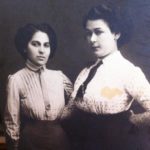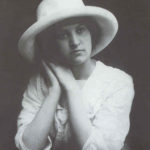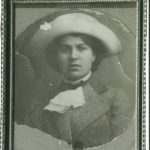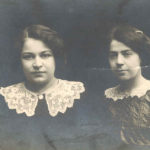Excerpted from “Paper Life,” by Louise Goldstein, with the addition of information from researcher Nadia Lipes of JEWua.Info.com (2019).
Fenya Ronen was born September 13, 1895 to Meir and Chana-Rasya Ronen, probably in Loyev, Rechitsa Uezd, Minsk Gubernaya (now in Belarus). She immigrated to the US on the Red Star Line SS Zeeland, arriving on April 15, 1913. Researching Fenya is limited by several factors: she never became a US citizen, never voted, never was employed and so never applied for Social Security. I have not been able to locate a marriage certificate and she seems to be singularly undocumented. Public access to Ukrainian metrical records (births, marriages, deaths) is regulated by a law that prohibits on-site research for genealogical purposes. Before the fall of the Soviet Union, the Mormons were not allowed in to microfilm records, as they have done elsewhere in the world; currently there are no relevant collections of records on the LDS site, FamilySearch.org. Therefore, her Alien Registration Form, Ship Manifest, US Census Records, Birth Certificates of her children and her Death Certificate are the only primary sources of information I have been able to discover so far. Recently (January, 2019), I hired genealogist Nadia Lipes in Kiev to research the Ronen family.
In the family tree below, I don’t know whether Fenya or Nechamka was the eldest, but I’m certain that Franka, Avraham and Sarah were younger than Fenya and Nechamka and that Sarah was the youngest. Nechama was also known as Anyuta. According to Alexander Beider, pretty much all Jewish women with the Russian name Fenya were named Feyge (“bird”) in Yiddish.
Here we see the addition family members identified by Nadia Lipes: Yakov, 1900-1903, and Sarah’s husband Grigoriy Lopushansky. Not shown is Sarah’s son, Yan, born ca 1930.
Nadia was unable locate documents for Chana Rasya; therefore we don’t know her maiden name or patronymic.
She seems to have been not very literate, all her letters to Fannie in the US but one (which she complains was difficult to write) are dictated to her daughters, who are compelled to write down her complaints that her health is failing because of the lack of letters from her daughter, her “I told you so” comments and chastisement of Fannie for not sending a photo quickly enough. The daughters, Nechamka and Franka, try to avoid this unpleasant duty, each saying she is busier than the other and anyway why couldn’t Sarah take a turn? The idea that Avraham could take the dictation was probably a non-starter, so he is never mentioned in this regard.
There are in the letters references to “our uncle” or “our relatives” in Fastov, a town near Kiev. There is no clue as to whether these were paternal or maternal relatives. Specific names are never mentioned, with the exception of a cousin Yossel who was killed, and whose father, whose name we have since learned was Froim Pashkoff, was accused of murdering a missing Christian boy[2] (see “The Ronen Family’s Blood Libel Ordeal”). The other exception is the mention that “Nekhamka from Fastov visited us.”[3]
From the letters we learn that Nechamka gave piano lessons, Franka (Franya) couldn’t find work and didn’t stay in school, Sarah was a young schoolgirl with what Nechamka thought was some musical ability,[4] and Avraham was wild and uncontrollable. Avraham was enrolled in the Brodsky school for boys, a trade school established by local Jewish businessman and philanthropist Lazar Brodsky, whose aim was to provide, in addition to education that reflected the most modern theories and techniques of the day, a moral and cultural atmosphere that he believed was wanting among the Jewish working class. Discipline was emphasized and uniforms required, which may have something to do with Avraham’s comment, “…you wouldn’t recognize me…” Unfortunately, Nadia Lipes was unable to find any Brodsky School records.
Avraham to Fannie
Dear sister Fenya,
How are you? I want to tell you that I am, for God’s sake, well. My news is, I am enrolled in the Brodsky School, in the freshman class. I’m wearing a uniform. If you saw me you wouldn’t recognize me. As soon as you get the letter write, write a lot. My best regards to Lova from me, your dear ____ Ronen[5]
From my mother Ethel Battalen Goldstein I learned that Meir was a
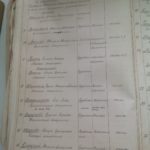
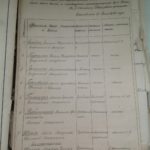
tailor who sewed uniforms for the Czar’s army. I was very impressed by this until I later learned that many people sewed uniforms for the Czar’s army, by the piece, likely in their own homes or small shops. From the documents here we learn that his master was Zelik Evseev Relin, “the bourgeois of Loyev,” (the Russian Empire had economic classifications) and that they both lived at 7 Basseynaya St. We also learn from this and Yakov’s birth registration that Meier’s father was Yankel.
Meier’s wife and daughters describe him as being useless as a breadwinner; in the few letters we have from him, he seems passive and resigned to a less-than-satisfactory life – what can one do?
Chana, meanwhile, awoke early to bake bread which she sold, Nechamka gave music lessons, Fenya was a seamstress[6] who worked for a woman named Genya before she emigrated[7] and this was often how the family seems to have been supported.
Chanah to Fannie
…We are working hard, as you know. On that we depend if we go to America.
I am thinking about Franya. What will she do here? They hire her for a year or two, not permanently. And time flies. She cannot afford to buy herself dresses or shoes, or anything else. We cannot help her. And if she doesn’t earn any money currently, would she have hope for the future? I believe in America she’ll find work easier…
We live in the same apartment as before. We’d like to have a bigger but it would cost more money. I cannot take that responsibility and I feel bad, not as healthy as I used to be. I work alone as you know. I am the only breadwinner in the family. The more expensive the apartment the more I have to work…[8]
Franka to Fannie
…I feel especially sorry for Mom; she has been working all day long baking bread, to sell. This is unbearable work for her. And, in order to start something else we need money. Everywhere, look around; we have to have that money. As for our father, you know him; if he had been more energetic we all would have lived better. He looks so tired, like an old, old man. He works very slowly. We could not have lived on his salary. But Mother is the only breadwinner.[9]
Meir appears to lack confidence in general, and was unsure that he would be capable of traveling alone, or of making a living in America. It also appears that Louis Battalen (Lova) is skeptical that Meir could succeed in America:
Meir to Fannie:
Personally, I would be able to come, but what is the problem? Franya also wants to come… Alone, I don’t have the strength and that I should come alone and she should not come…is no plan because she does absolutely no work in the house…So our plan remains if it is [illegible word], that you should send one shifts card so Franka and I will both travel, because one pass will cost the same money.
Dear Lova, that which you wrote to me, that for someone like myself America is really not good. My answer is that I can work but I’m very uncertain about this…[10]
As far as I’m aware, Fenya was the only Ronen to come to the US.
Other Ronen Family Members
We have this photo of the toddler Vitichka (Victor), dated August 6, 1934 and addressed to his “…dear aunt, uncles, sisters, brothers…;” presumably one of Fannie’s siblings was Vitichka’s
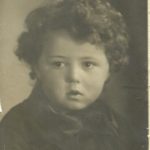
mother or father. This is also the latest date of any correspondence we have. Ethel Battalen Goldstein described her mother as having a “deep bow” in her upper lip; one sees the same in this photo.
One of the last letters to be translated revealed a child named Yakov. It’s not clear who this child is, whether he’s a sibling, nephew, cousin or neighbor.
Louis to Fenya
New York, 9 July
Dear Fenichka!
… And Yakov–son. You write that he cries, so I already order that when he comes here, he should be a quiet, calm boy.[11]
This is not the Yakov born in 1900, who was long-deceased by the time Louis wrote this letter.
Footnotes
[1] “Chana” is the name with which Fannie’s mother signed her letters.
[2] Letter from Nechamka Ronen to Fannie, dated March 1914.
[3] Franya Ronen to Fannie, Kiev, June 6, 1914
[4] Letter from Nechamka, 12-29-1913: “…that I want to start teaching Sarochka to play…in music, I think, she will be successful. She has desire, an enormous memory, an ear also…”
[5] From Ronen family to Fannie & Louis, Kiev, January (?), 1914
[6] Ship Manifest
[7] Various Ronen family letters
[8] Chana to Fannie, after April 15, 1913, before 1919.
[9] August 30, 1922, Franka to Fannie
[10] January, 1914,
[11] Louis to Fenya, New York, July 9, Roma’s address

